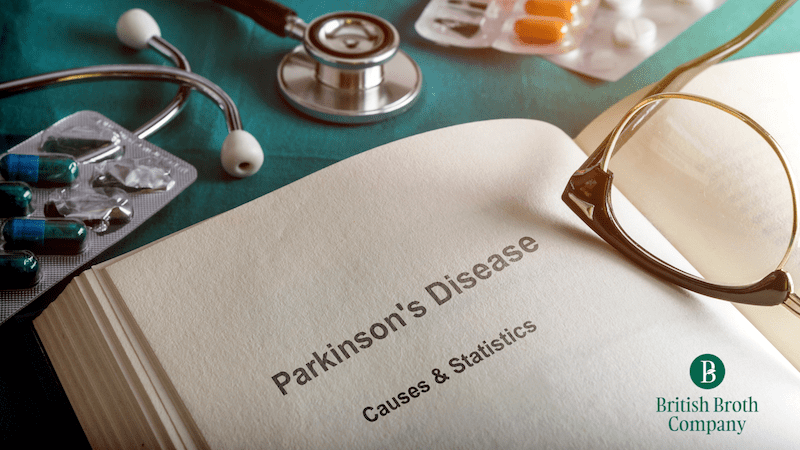In this article we explore the Link Between Gut Health and Parkinson’s Disease. In recent years, the relationship between gut health and brain diseases has drawn increasing attention, especially in the study of neurodegenerative disorders like Parkinson’s disease.
Parkinson’s is a progressive neurological condition affecting nearly 10 million people globally, characterised by symptoms such as tremors, stiffness, slowness of movement, and impaired balance. The primary cause of these symptoms is the degeneration of dopamine-producing neurons in the brain. However, new research suggests that the origins of this brain disorder may lie not only in the brain but in the gut as well.
The Gut-Brain Axis: A Key Player in Parkinson’s
The “gut-brain axis” refers to the complex communication network between the gastrointestinal system and the brain, which plays a crucial role in maintaining overall health. The gut, often called the “second brain,” is home to trillions of bacteria, fungi, and other microorganisms, collectively known as the gut microbiome. These microbes are essential for digestion, immune function, and even influencing mood and cognitive functions.
Recent studies have shown that disruptions in the gut microbiome can have far-reaching consequences, impacting brain health and potentially contributing to neurological disorders. Parkinson’s disease, in particular, has been linked to gut dysfunction for over a decade, with growing evidence that gastrointestinal issues like constipation can precede motor symptoms by years, if not decades.
Key Findings from Recent Research
Several groundbreaking studies in 2023 have further explored the connection between Parkinson’s and the gut. One of the most notable studies, published in the journal Nature, discovered that the misfolding of a protein called alpha-synuclein—believed to be a key driver of Parkinson’s disease—may begin in the gut before spreading to the brain. Alpha-synuclein is naturally present in the body, but when it clumps together abnormally, it forms harmful structures called Lewy bodies that disrupt brain function.
In this study, researchers found that abnormal alpha-synuclein aggregates could originate in the gut’s enteric nervous system, which controls digestion, before travelling along the vagus nerve to the brain. The vagus nerve, one of the largest nerves in the body, directly connects the brain and the gut, providing a potential pathway for these harmful protein clumps to spread.
This finding supports earlier epidemiological studies that showed individuals who had undergone a vagotomy—a surgical procedure that removes parts of the vagus nerve—had a significantly reduced risk of developing Parkinson’s disease. It also suggests that gut inflammation or microbial imbalances could trigger the initial misfolding of alpha-synuclein, setting off a chain reaction that eventually leads to Parkinson’s.
The Role of Gut Microbiota
Another area of active research involves the composition of the gut microbiota—the community of microorganisms living in the digestive tract. Studies have found that people with Parkinson’s disease often have a distinct gut microbiome compared to healthy individuals. For example, individuals with Parkinson’s tend to have lower levels of certain beneficial bacteria, such as Prevotella, which is involved in producing fatty acids and maintaining the integrity of the gut lining.
Conversely, harmful bacteria that promote inflammation are often more prevalent in the guts of Parkinson’s patients. Chronic gut inflammation could accelerate neurodegenerative processes by releasing inflammatory molecules into the bloodstream, which then travel to the brain, exacerbating neuronal damage.
This opens up new possibilities for treating Parkinson’s by targeting the gut. For example, some scientists are investigating whether probiotics, prebiotics, or dietary interventions could help restore balance to the gut microbiome and potentially slow the progression of the disease.
Implications for Early Diagnosis and Treatment
These findings are not just academic—they have significant implications for how Parkinson’s disease could be diagnosed and treated in the future. If Parkinson’s begins in the gut, it could provide a valuable window of time for early diagnosis and intervention, potentially delaying or even preventing the onset of motor symptoms. Researchers are now exploring ways to detect alpha-synuclein aggregates in the gut, which could serve as an early biomarker for Parkinson’s long before cognitive or physical symptoms appear.
In terms of treatment, targeting the gut-brain axis could offer new therapeutic strategies. For example, anti-inflammatory drugs, dietary changes, or microbiome-focused therapies could be used alongside traditional Parkinson’s medications to treat both the neurological and gastrointestinal aspects of the disease. Moreover, fecal microbiota transplants (FMT)—in which a healthy donor’s gut bacteria are introduced into the patient’s gut—are being explored as a potential therapy for Parkinson’s, though more research is needed.
Conclusion: A New Frontier in Parkinson’s Research
The growing body of evidence linking Parkinson’s disease to gut health opens up exciting new avenues for understanding, diagnosing, and treating this complex disorder. While much is still unknown about the exact mechanisms behind the gut-brain connection in Parkinson’s, recent studies provide hope that future treatments could not only address the symptoms but also target the root cause of the disease.
By recognising the importance of gut health in Parkinson’s, researchers and clinicians are forging a new path toward more effective and comprehensive care for millions of people affected by this debilitating condition.
Source information:
https://corporate.dukehealth.org/news/new-evidence-suggests-link-between-gut-health-and-parkinsons-disease
https://translationalneurodegeneration.biomedcentral.com/articles/10.1186/s40035-023-00392-8
https://translationalneurodegeneration.biomedcentral.com/articles/10.1186/s40035-023-00392-8





